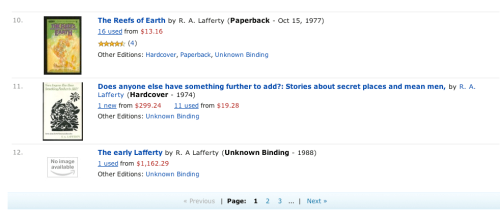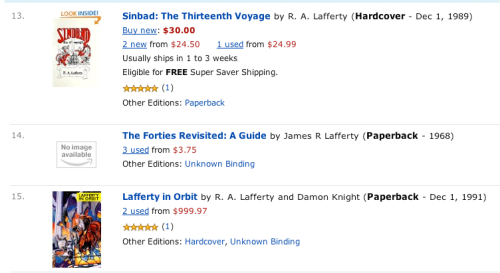What does “top” mean, as in NPR’s “Top 100 Science-Fiction, Fantasy Books“? It clearly doesn’t mean “best.” The only Philip K. Dick title on the list is Do Androids Dream of Electric Sheep, a book much inferior to The Man in the High Castle, Martian Timeslip, The Three Stigmata of Palmer Eldritch ((Can you devise a more portentious title?)) or even Ubik. Gene Wolfe, the best science fiction and fantasy writer currently active and perhaps the best writer of any kind alive, period, barely makes the list at #87. Ray Bradbury makes the list four times; he’s good, but he’s not that good. Ditto Neil Gaiman and Neal Stephenson. Isaac Asimov is in it three times, which is three times too many. Missing entirely: R.A. Lafferty, Joanna Russ, Thomas Disch, Italo Calvino, Cordwainer Smith, Lord Dunsany, Henry Kuttner (and C.L. Moore), Poul Anderson, Stanislaw Lem, Jorge Luis Borges, Tim Powers, John Bellairs, Algis Budrys and many more I’ll think of later.
Category: Culture and anti-culture
Prelude to a sleepless night
I’d like to meet the man who invented the subwoofer. I don’t want to shake his hand; I want to slug him in the solar plexus. It is hard to think of any other innovation that has done as much to make life in the 21st century needlessly unpleasant. I feel lousy tonight, and I’d like to go to bed early. However, the inhabitants of my neighborhood believe that it is their inalienable right to party all night long on weekends, and that includes playing bad music loudly. I cannot not listen to music, no matter how stupid, and low bass notes can penetrate ten feet of concrete. Sometimes the neighbors will turn the garbage down or off if I ask them, but I have to get out bed and dress first, and when I get back home, it can be an hour before I’m drowsy enough to think about sleep again.
I’ve observed many times that the worse the music, the more loudly it is played. My hypothesis is that the chief pleasure in playing rap, techno ((“Disco for robots”)) and the like lies not in what minimal musical virtues the recordings might have — you’d have to be pretty damned stupid to find such drivel intellectually or aesthetically interesting — but in tormenting those who cannot escape the exaggerated, mindless beat.
From Parma Tyelpelassiva
Recognize this?
Man naeg mathal, ae maethor veren,
Erui reniol ar nimp?
I thâr pellen uin ael
Ar ú-linnar in aew.
Actually, you do know the poem of which this is the first stanza, though probably not in this translation.
There’s more poetry here, and much else about Tolkien’s languages, including downloadable courses. ((It’s oddly refreshing to see such an old-fashioned website.)) Here’s an overview of the Elvish languages.
Recent discoveries
Stephane Grappelli as the cat in Peter and the Wolf.
*****
“Just once, I’d like to meet an alien menace that wasn’t immune to bullets.”
An outstanding example of obsessiveness: a fan-made Doctor Who anime.
(Via Chizumatic.)
Update: And it’s gone, which is a pity. The video was an impressive piece of animation. The auteur’s site is here.
Update II: You can watch it here.
What has been seen …
… cannot be un-seen. Here’s what happens when you combine the Lord of the Rings and MikuMikuDance:
(Via the Borderline Boy.)
Quote of the week
The catalog was the book that confirmed to me — who was six, mind you — that America must be the best and the greatest country in the world. Later when I came to America, my faith was validated.
(Via .clue.)
Good havoc, bad havoc
I’m currently downloading the restored version of Da nao tian gong, or Havoc in Heaven, a Chinese animated film from the early 1960s. Ordinarily I would mention this on my animation weblog, but the film is worth noting for historical reasons:
The Shanghai animation scene had gotten going in earnest in the early 1950’s, once things had settled down from WWII and the Chinese Civil War, and had gotten bigger, better, and more successful. This film was the last one made there, and it was a critical and commercial success, getting all kinds of awards.
Shortly after this film was released, the entire industry was shut down by the Cultural Revolution. It’s one of the lesser crimes of that terrible event, but a crime nonetheless. The sheer mastery of the animation form in this film offers the promise of much that might have come after, but didn’t… because it didn’t fit within Mao’s idea of how the nation should be.
Literary notes
Clare Vanderpool used to work in the youth ministry office here in the Wichita diocesan chancery. She got married and left the office, and I eventually lost track of her. I just now discovered that not only has she published a novel, Moon Over Manifest, but it won the 2011 Newberry Award.
*****
Tim Powers is occasionally compared to Neil Gaiman, but the writer he most reminds me of is that other Inkling, Charles Williams. Novels like The Anubis Gates and Expiration Date are direct descendents of Williams’ “spiritual thrillers.” As of 1/11/11, Declare, possibly Powers’ best book, is available at audible.com.
*****
If you’re wondering where I found the name for this weblog, it’s from John Bellairs’ little metaphysical farce, The Pedant and the Shuffly. While checking on other matters this morning, I found that all of Bellairs’ non-young adult books have recently been collected into a single volume, Magic Mirrors, including The Pedant and The Face in the Frost. Of note is St. Fidgeta and Other Parodies, which Catholics who remember “aggiornamento” will particularly appreciate.
Is there no one who feels like a pair of pants?
Professor Mondo posts an old favorite: “Fresh Air.”
Books as investments
What does $1,186.27 look like?
If that had been the paperback edition of Lafferty in Orbit, you’d be looking at $2,162.26. However, a hardcover like the one pictured is available for a mere $23.98.
By the way, if you ever spot any collection of Lafferty’s stories in a used book store — Nine Hundred Grandmothers, Strange Doings, Does Anyone Else Have Something Further to Add, Ringing Changes, Lafferty in Orbit, Iron Tears — grab it. There never was any other writer like him.
50 books
I came across yet another list of the “100 science fiction books everyone should read.” Like every other one I’ve seen, it’s an arbitrary selection and not at all what I would have chosen (though it does earn a point for mentioning The Fifth Head of Cerberus.) Rather than reprint that list here with the usual “bold what you’ve read,” I instead compiled my own. It’s half the length of the other and perhaps just as arbitrary, but I daresay it’s better reading.
A lot of writers you might have expected are missing. In some cases it’s because I haven’t read them yet, but usually it’s deliberate. For instance, I have no desire to re-read anything by Isaac Asimov no matter how historically important he may be, so why include The Foundation Trilogy? (And I think John Sladek is more reliable on the Three Laws of Robish, anyway.)
There are a lot of short story collections mentioned. Partly it’s because I like short stories, but mainly it’s because many writers are better at shorter lengths.
I could easily have made a valid list using just the works of Wolfe, Wells, Lafferty and Dick, but I’ll leave that as an exercise for the obsessive.
Douglas Adams, The Hitchhiker’s Guide to the Galaxy: the Original Radio Scripts
J.G. Ballard, Chronopolis
Greg Benford, Timescape
Alfred Bester, The Stars My Destination, Starburst
Ray Bradbury, The Martian Chronicles
Algis Budrys, Rogue Moon
Anthony Burgess, A Clockwork Orange
Arthur C. Clarke, Childhood’s End
Samuel Delany, Driftglass
Philip K. Dick, The Man in the High Castle, The Preserving Machine, or any other of his better novels or short story collections
Thomas M. Disch, Fun with Your New Head, Camp Concentration
William Gibson, Neuromancer
Aldous Huxley, Brave New World
Diana Wynne Jones, A Tale of Time City
C.M. Kornbluth, The Best of C.M. Kornbluth
Frederick Pohl & C.M. Kornbluth, The Space Merchants
Henry Kuttner, The Best of Henry Kuttner
R.A. Lafferty, Nine Hundred Grandmothers, or any other collection of his short stories ((If you need evidence that there is something fundamentally wrong with the publishing industry, note that The Collected Stories of R.A. Lafferty still doesn’t exist.))
Ursula K. Le Guin, The Wind’s Twelve Quarters
Stanislaw Lem, Solaris, The Cyberiad
Barry Malzberg, The Best of Barry N. Malzberg, or whatever else you can find ((It is not required to read a lot of Malzberg; a brief glimpse of his universe will suffice for most readers.))
Walter M. Miller, Jr., A Canticle for Liebowitz
George Orwell, 1984
Frederick Pohl, The Best of Frederick Pohl
Rudy Rucker, Master of Space and Time, or any collection with Harry Gerber stories
Joanna Russ, The Adventures of Alyx, And Chaos Died
Mary Doria Russell, The Sparrow
Robert Sheckley, Dimension of Miracles, or any collection of his short stories
Keiichi Sigsawa, Kino no Tabi ((Good luck finding this one. The contract to publish the Kino stories in English fell through shortly after the first volume was printed. You can get a taste of Sigsawa’s work by watching the animated series Kino’s Journey, which heads my short list of anime for people who think they hate anime.))
John Sladek, Tik-Tok, Mechasm
Cordwainer Smith, The Rediscovery of Man
Olaf Stapledon, Star Maker
Neal Stephenson, The Diamond Age
William Tenn, Immodest Proposals, or any other collection of his short stories
James Tiptree, Jr., Ten Thousand Light Years from Home, or any other collection of her short stories
Yasutaka Tsutsui, Salmonella Men on Planet Porno
Jack Vance, The Dying Earth
Kurt Vonnegut, The Sirens of Titan
Ian Watson, The Very Slow Time Machine, or any of his early novels
H.G. Wells, The Island of Dr. Moreau
Gene Wolfe, The Island of Dr. Death and Other Stories and Other Stories, The Book of the New Sun
John C. Wright, The Golden Age trilogy
Yevgeny Zamyatin, We
Eldritch prose
Depending on which sample of text I use, I also write like Stephen King, J.K. Rowling, Dan Brown (ugh), Kurt Vonnegut, Douglas Adams, Chuck Palahnuik, Isaac Asimov, Daniel Defoe, Margaret Atwood, Vladimir Nabokov, George Orwell, Oscar Wilde or James Joyce. But not R.A. Lafferty or Flann O’Brien. Oh well, nobody else can really write like them, either.
Actually, when I read my writing, it just sounds like me.
Update: A bit of background about that site.
Quote of the week
“Sing to the Mountains” is really not all that bad, if you imagine it being sung by the Muppets.
From the comments here.
How’s your Cyrillic?
Miscellaneous links
An old interview with the late Martin Gardner. (Via .clue.)
Miku does Mozart. ((Background on Hatsune Miku here.))
Two items
Spotted at Costume-Con 28:
Update: I’ve uploaded the first batch of pictures here.
*****
Don’t waste your money and time on Hollywood drivel. Watch The Secret of Kells instead.







